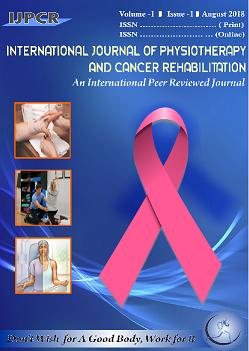International Journal of Physiotherapy and Cancer Rehabilitation
SEARCH
Our Founder
Popurlaly known as ‘jannu bhai’, the Late manishi’s vision, farsightedness and sacrifice have enabled us reach the stature we enjoy today More...Vice Chancellor's Message
It gives me immense pleasure to learn that the 1st volume of international journal of physiotherapy and cancer rehabilitation is being More...Cover Page Volume I Issue I
 .
.
IJPCR
UTILIZATION OF TRADITIONAL, COMPLEMENTARY AND ALTERNATIVE TREATMENTS AMONG MENTALLY ILL PEOPLE IN INDONESIA: A QUALITATIVE CONTENT ANALYSIS
Imam Waluyo Septian Gandaputra Muhammad Arsyad Subu, Sarkosih Sarkosih Djadjang Aditaruna, Siswo Purwanto
Abstract:
Little information is known regarding the use of traditional, complementary and alternative treatments among mentally ill people, their families and community members in Indonesia. This study is a part of a larger PhD dissertation that explores the use of traditional, complementary and alternative treatments among people with mental illness. A qualitative content analysis method was used. Data collection method involved semi-structured interviews, document review, field notes and memos. Content analysis was employed to organize and manage data. Study identified five themes: (1) the first choice of treatment for mental illness, (2) possessed by demons, Satan, or spirits, (3) sinful illness (illness caused by sin), (4) types of traditional complementary alternative treatments, and (5) violent treatments conducted by traditional healers. Study results indicated that complementary – alternative and traditional treatments and „smart people? (healers) are the central roles in offering and providing treatments as solutions when people have mental illness in Indonesia. Visiting complementary – alternative and traditional therapists, is the first choice of people (patients, families and other community members) when dealing with treatments of mental health problems. Further research is needed to understand the attitude or perspective of the family, the community and government staff as participants regarding these treatments. More importantly, it is needed to understand the effectiveness of these treatments which is still poorly studied in Indonesia. In addition, quantitative research is needed to examine the factors that affect the utilization of traditional or alternative therapies by 2
Keywords: -